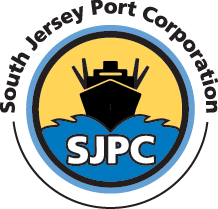Supply chain discussions are often dominated by global corporate giants, but the world’s supply chain depends on thousands of local small companies like Page Lyons’s Tri-State Bulk Handling to be the ball bearings that make the global trade machine run smoothly.
“America is built on small business and so is the world’s supply chain,” said Lyons whose family-owned-and-run stevedoring companies have moved tens of millions of tons of bulk cargo at the South Jersey Port Corporation’s marine terminals in Camden.
“Page is a fantastic partner who we, at the port, and his customers trust to get the job done,” said Andy Saporito, Executive Director and CEO of the South Jersey Port Corporation. “He is successful because he is customer-focused and handles cargo the way the customer wants: fast, safe, and efficient. And, by the way, he is a people person which is important in our industry where personal relationships are the coin of the realm.”
An affable man with a quick wit and an appetite for prudent risks, Lyons is a first-generation port man pro, born in the steel town of Weirton, West Virginia. Graduating in 1972 from Bethany College, a small Christian liberal arts college in his native state, he moved with his college sweetheart to Malvern, Pennsylvania, where they started a family. He spent the next nine years bouncing from job to job until his gig as the charming tennis pro at a local club landed him a job as manager of bulk sales and operations at Lavino Shipping Company.
A quick learner with a gnawing ambition to branch out on his own, three years later, Lyons took the biggest risk of his life. At age 37, he started his own stevedoring company, Tri-State Bulk Handling, and the clients he developed at Lavino followed him to South Jersey Port’s marine terminals in Camden, New Jersey, which is a national leader in bulk and breakbulk cargo. Nine years later, he would take another risk and create Broadway Conveyor Corporation to improve the efficiencies of his operations.
“It’s all about relationships in this industry and the trust you build,” said Lyons. “You maintain clients by delivering beyond what is expected and by developing trust with everyone who is moving that cargo, from truckers to machine operators, from the terminal management to the ship’s crew. There are robust discussions and strong opinions that are resolved by relationships. You help them to be successful, they help you be successful. It’s mutual success.”
A case in point is the contract that Lyons has today with Lehigh Hanson Cement to move 600,000 tons of bulk slag cement annually. From 1984 to 1999, Lyons handled iron ore, coal, pet coke, sand, and magnesite on lease parcels at SJPC’s port terminals in Camden. He always evolved with the changing times and changing market needs. In 1999, the South Jersey Port Corporation wanted to lease Lyons’ parcel to Saint Lawrence Cement (the predecessor of Lehigh Hanson). Lyons gave up his leases as part of the deal to land St. Lawrence Cement which included significant capital investments along the pier and a new crane and economic development in Camden. Saint Lawrence gave Tri-State a 10-year contract and it has been renewed by multiple owners since – a testament to the service his company provides.
To better serve his customers, he created the Broadway Conveyor Corporation and invested $5 million to a state-of-the-art conveyor system to move the granular materials efficiently. With the exception of a one-hour “hiccup,” the Lyons’ team has fed the cement manufacturing plant for 23 years without shutting it down. The final loading of the barges and trucks from the silos is completely automated through an underground system to prevent dust. Additionally, Lyons’ team at the Balzano Marine Terminal helps feed 100,000 tons of gypsum annually to the Georgia Pacific operations.
Lyons has a strong commitment to his operation’s host city, Camden. Most of his fourteen employees are city residents. He even invested in a local restaurant but equally important is his sensitivity to the impact of his operations on the community. “We are always working to be a good neighbor,” he said.
All of Tri-State’s bulk-moving equipment are powered by Tier 4 diesels, the Environmental Protection Agency’s strictest emissions requirement for off-highway diesel engines. “In time, we’ll move to an electric fleet to further reduce our carbon footprint” Lyons predicted.



